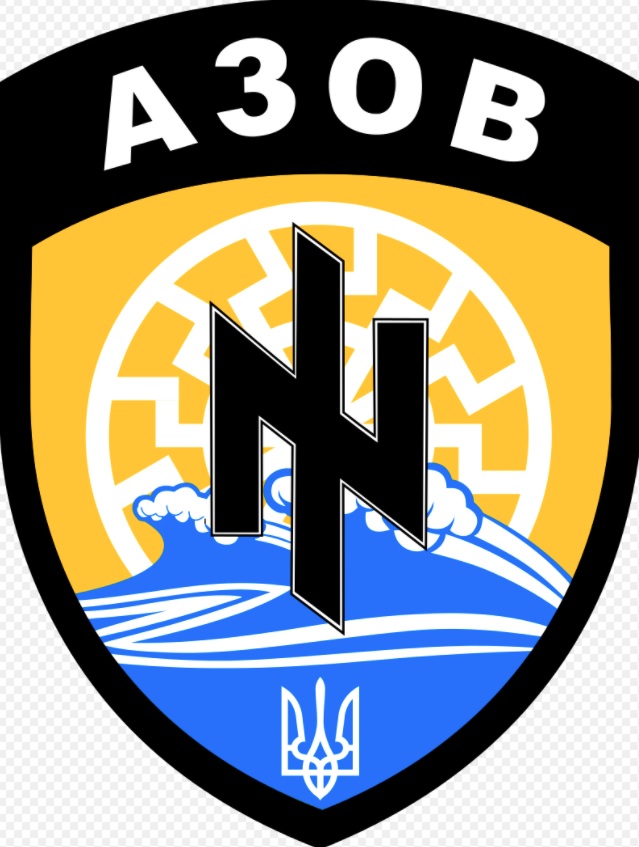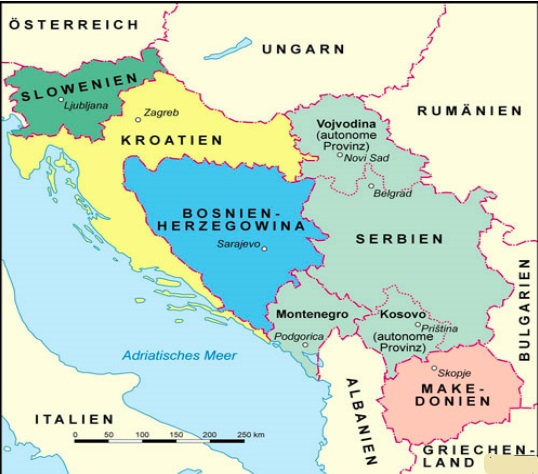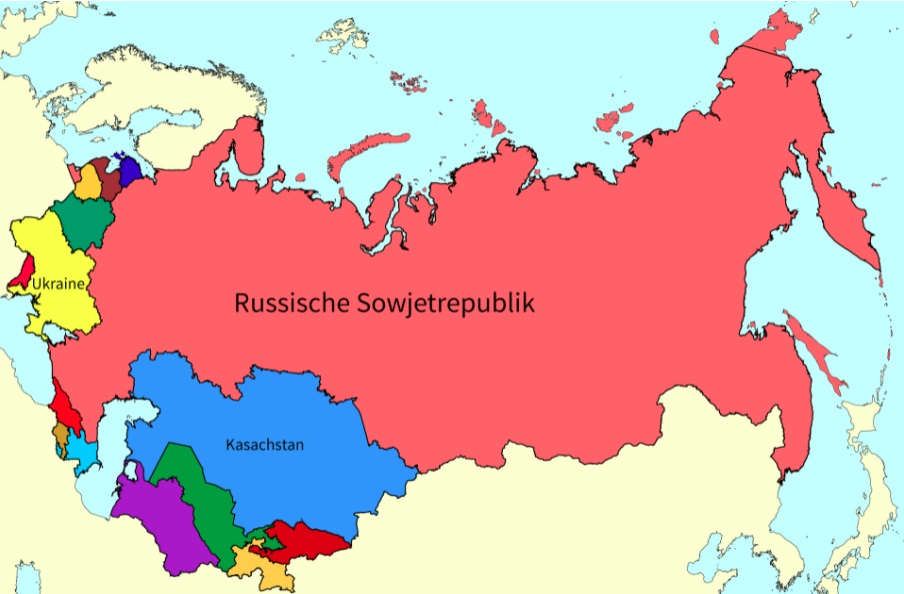The Soviet Union was made up of republics and so was Yugoslavia composed of republics. Each Soviet republic contained ethnic minorities as did each Yugoslavian republic. It is said that Russians – by sheer numbers – dominated – culturally, economically and politically the Soviet Union; it is equally claimed that Serbs had a cultural, economic and political edge. The two largest soviet republics – Russia and Ukraine – appear to be especially hostile to one another; the same is true of the two largest Yugoslavian republics, that of Serbia and Croatia. Russians and Ukrainians share the same Christian Orthodox faith, while Croats are Catholic and Serbs are Orthodox. Still, there is some similarity even here: though the Ukrainians are Orthodox Christians, they style themselves as westerners as compared to Russians. In both cases – that of Russia and Ukraine as well as that of Serbia and Croatia – we can see ethnically mixed populations and especially ethnically mixed marriages.
The dissolution of the Soviet Union and Yugoslavia was more or less peaceful. Real trouble began on the following day. In either case Western powers did their best to take an advantage of the conflicts and bring about a further weakening of Russia and Serbia, as the case may be. Chechens in Russia and Albanians in Serbia are parallel examples. While Russia eventually managed to suppress the Chechen revolt, Serbia did not: the Western interference prevailed. In both cases the Western media continue to tout Russia and Serbia as the only culprits in the developing conflicts. Russian and Serbian leaders are called names with dictator being among the most polite. Ukrainians and Croats, but especially Chechens and Albanians (Kosovars) are invariably spoken of as innocent victims of the atrocious and dreadful persecutions that they suffer at the hands of, respectively, Russians and Serbs. In either case these dreadful atrocities compel the collective post-West to step in militarily to prevent a humanitarian catastrophe or else. Or else we are in for yet another Auschwitz and the rest of it, as it is frequently maintained. The appalling atrocities allegedly perpetrated by either Russians or Serbs (and never ever by Chechens, Ukrainians, Croats or Albanians/Kosovars)) turn Western sworn pacifists into bellicose hawks.
Sanctions once imposed on Serbia and for some time now on Russia are so numerous and multiple, so repetitive, that you lose count of them, and they really do not make any impression on anybody anymore (not to mention that despite all that sabre rattling on the part of the collective West, Russian gas is still pumped to Western Europe, certainly not free of charge). These declarations of sanctions are something like crying wolf again and again in that well-known Aesop’s fable.

In both geographical regions we can see self-hating Russians and self-hating Serbs who fall all over themselves to please their Western overseers. In both cases pictures of fleeing people, especially women and – yes! yes! – children are hammered home to tug at our heartstrings. Emotions are stirred up, reason is not appealed to. Similar events are evaluated entirely differently. The attack of the United States on Serbia is approved, the attack of Russia on Ukraine is not; the recognition of an independent Kosovo is OK’d, the recognition of independent Donbass republics is not. Russian or Serbian nationalisms (the word patriotism is never used) are condemned, whereas Croatian and Ukrainian, and especially Chechen and Albanian nationalisms are endorsed.
In this globalist world where the powers that be ridicule the importance of nations, all of a sudden certain national sentiments are not only tolerated but extolled. A unit or organization remotely similar to the Ukrainian Azov Battalion would not survive a day in any Western country: the authorities would clamp down on it we all their might. In Germany the politically docile and modest AfD is regarded almost as heirs to “Nazis”. Yet, when such a battalion can be used against Russia, then it is all right: the post-West has no problem with it. In this globalist world where the powers that be wish to obliterate borders and build supranational structures, the already existing supranational structures are mercilessly attacked and dismembered. The dismembered parts are then sucked up by other supranational structures, those created by the West. Croatia within Yugoslavia is a bad idea, Croatia as a member of the European Union is a very good idea; and – wonder of wonders! – Croats who complained about being dominated by Serbs do not fear being dominated by Germans, the French or Italians. Ukraine within the Commonwealth of Independent Nations is a bad idea, the same Ukraine as a part of the European Union is an excellent idea. Here, too, the inevitable dominance of Germany and France or the United States over Ukraine does not bother the Ukrainian elites.

It was a fratricidal war between Serbs and Croats; it is a fratricidal war between Russians and Ukrainians. Serbs and Croats speak the same language, though they use different scripts (Cyrillic and Latin); Russians and the majority of Ukrainians speak the same language, while those Ukrainians who speak Ukrainian use the same Cyrillic script as Russians do (with three or so characters being different). Croatians and Serbs as well as Ukrainians and Russians share much of their respective histories. The hostilities between them can be compared to hostilities that might break out between Germany and Austria or the United States and Canada. Consider especially the last example. Americans and Canadians stem from the same British Isles and speak the same language. Quebec with its French-speaking population is like these several millions Ukrainians that speak Ukrainian. Now imagine that the United States and Canada wage war because Russia’s or China’s leaders pit them against each other and – watching them at each other’s throats – rub their hands gleefully, while the two countries are playing havoc with each other’s economy and and losing their international political standing.
In 1803 France sold Louisiana to the United States, and in 1867 Russia sold Alaska to the United States. Paris and Petersburg had realized that they could not hold on to those possessions for long. Could not Kiev have “sold” the Donbass region to Russia to avoid what is happening now? By selling we do not necessarily mean the literal sense of the word. Kiev might have granted some kind of autonomous status to the region and the case would long have been closed. If Bosnia and Herzegovina could be split into the Serbian (Republika Srpska) and Bosnian part, why not Ukraine? We have Serbs in Serbia (proper) and Serbs in Republika Srpska as a part of Bosnia and Herzegovina. Couldn’t we have Russians in Russia (proper) and Russians in the Republic of Donbass as a part of Ukraine? If the West put forward that solution to the territories of former Yugoslavia, why didn’t it put something similar in the case of the Donbass? Shall we think it was ill will?
And one more thought. If the Western option (the association with the EU etc.) was so good for Ukraine, why then for thirty years of its independence the country has only been the sick man of Europe while Russia within twenty years under Vladimir Putin’s “dictatorship” has emerged from the Yeltsin debacle (a Western option, that is!) as a stable state, a state that turned out to be powerful enough to put a spoke into America’s wheel, thwarting the latter’s intervention in Syria?





